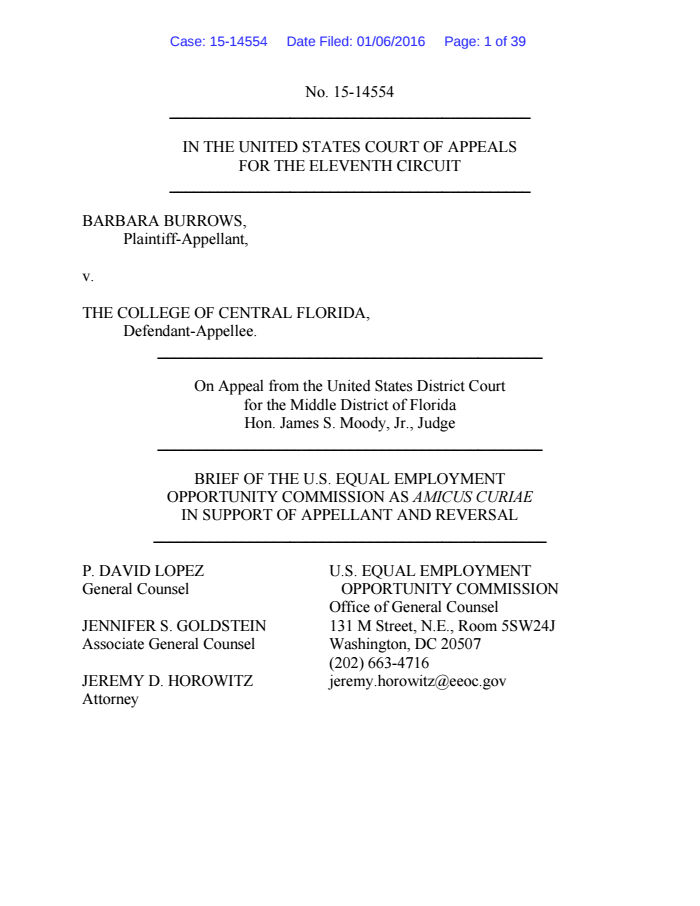
The federal agency charged with enforcing existing civil rights laws has urged a federal appeals court to rule that sexual orientation discrimination is a form of sex discrimination and therefore illegal under Title VII of the Civil Rights Act.
In a filing at the 11th Circuit Court of Appeals on Wednesday, the Equal Employment Opportunity Commission wrote that "sexual orientation discrimination is sex discrimination, and such sex discrimination violates Title VII."
In supporting the appeal of Barbara Burrows, whose lawsuit against the College of Central Florida was tossed out by a trial court judge, the EEOC wrote, "The district court’s treatment of sexual orientation discrimination as distinct from sex discrimination is untenable and based on a fundamentally flawed premise."
The move is the latest step from the EEOC and advocates in an effort to protect LGBT people from discrimination under existing civil rights law.
A series of EEOC rulings and court cases have aimed to provide protection to transgender people through rulings that gender identity is covered under Title VII, as well as Title IX of the Education Amendments of 1972. A second set of rulings and cases, including Burrows's case, has focused on providing protection to lesbian, gay, and bisexual people through rulings that sexual orientation is covered under Title VII and Title IX.
The EEOC ruled in July 2015 that "allegations of discrimination on the basis of sexual orientation necessarily state a claim of discrimination on the basis of sex” barred by Title VII. That ruling, while applicable to federal agencies and in the EEOC's own work, is not binding on federal courts. The move in Burrows's case is an attempt to get federal courts to affirm its interpretation of the law.
In explaining its argument in Burrows's case, the commission wrote Wednesday that there are three reasons that sexual orientation discrimination should be covered by existing laws against sex discrimination.
First, the EEOC argues, sexual orientation discrimination necessarily involves gender stereotyping, which the Supreme Court has repeatedly said is banned under Title VII. "[A]n employer who discriminates because of an employee’s homosexuality necessarily discriminates because of that employee’s failure to conform to a gender-based stereotype: the stereotype of opposite-sex attraction," the EEOC's lawyers write.
Second, it argues, sexual orientation discrimination is a type of associational discrimination, which also violates Title VII. "If a plaintiff is in a relationship with someone of the same sex, and an adverse employment consequence results from that relationship, discrimination has occurred 'because of [the plaintiff's] . . . sex,' in violation of Title VII," the EEOC lawyers argue in the brief.
Finally, and most basically, the EEOC argues that sexual orientation discrimination is, definitionally, a type of sex discrimination. "[S]exual orientation discrimination is also inherently sex-based discrimination because sexual orientation cannot be understood without reference to an individual’s sex (in conjunction with the sex of those to whom the individual is physically and/or emotionally attracted)."
As the commission lawyers conclude, "[S]exual orientation discrimination necessarily requires impermissible consideration of sex. It should therefore be held illegal under Title VII."
In December, a federal judge in California agreed with the EEOC's interpretation of the issue, finding that sexual orientation discrimination is covered under the sex discrimination ban in Title IX.
The Justice Department formally supported the EEOC’s position as to gender identity at the end of 2014. Since then, Justice has taken that position in a handful of court cases, through the filing of statements of interest or amicus curiae briefs in cases from Texas to Virginia.
The Justice Department has not, however, weighed in yet on the sexual orientation question at issue in Burrows's case.
Read the EEOC brief's conclusion:


